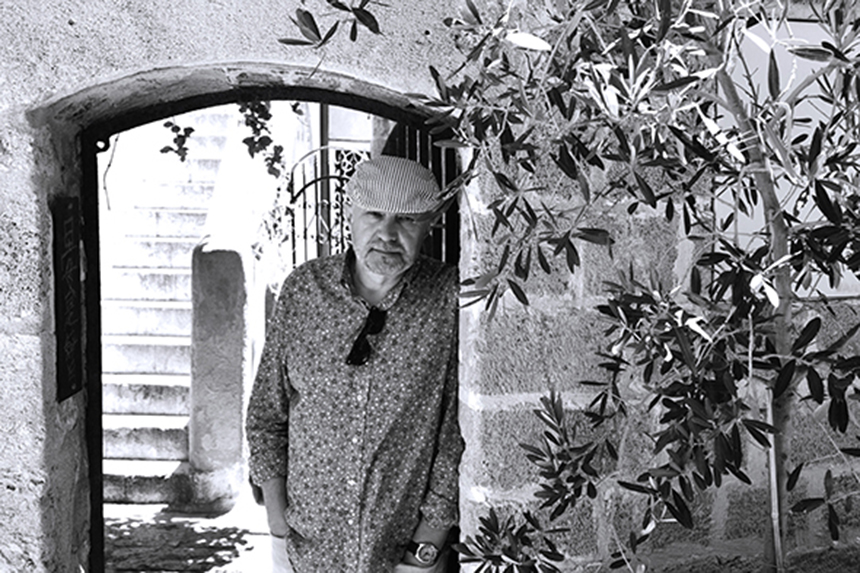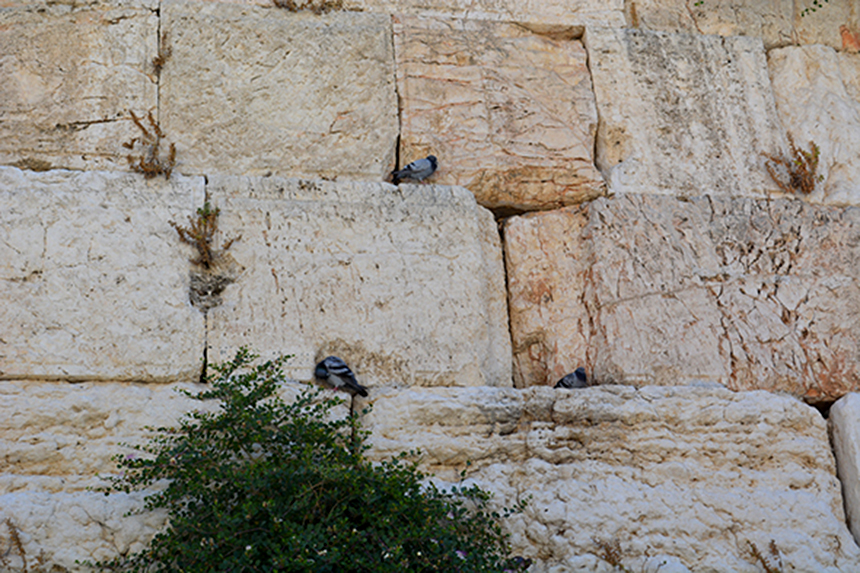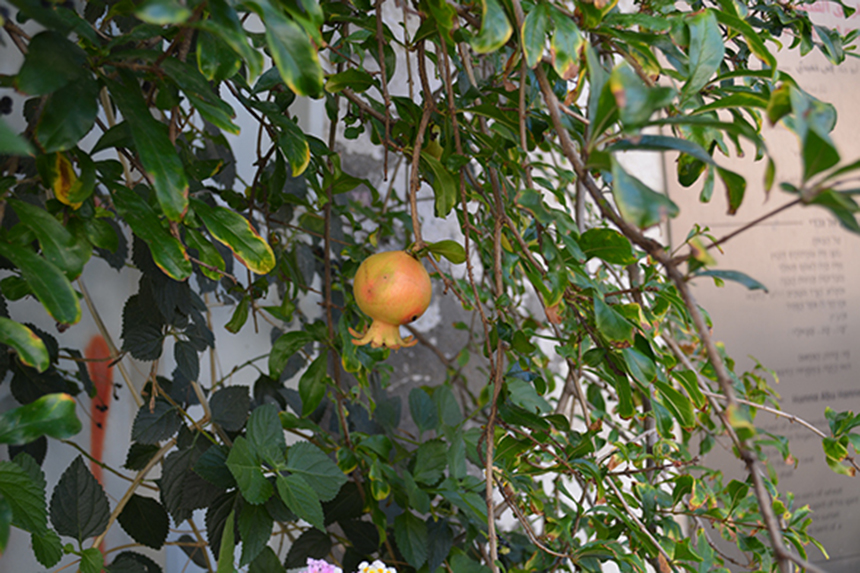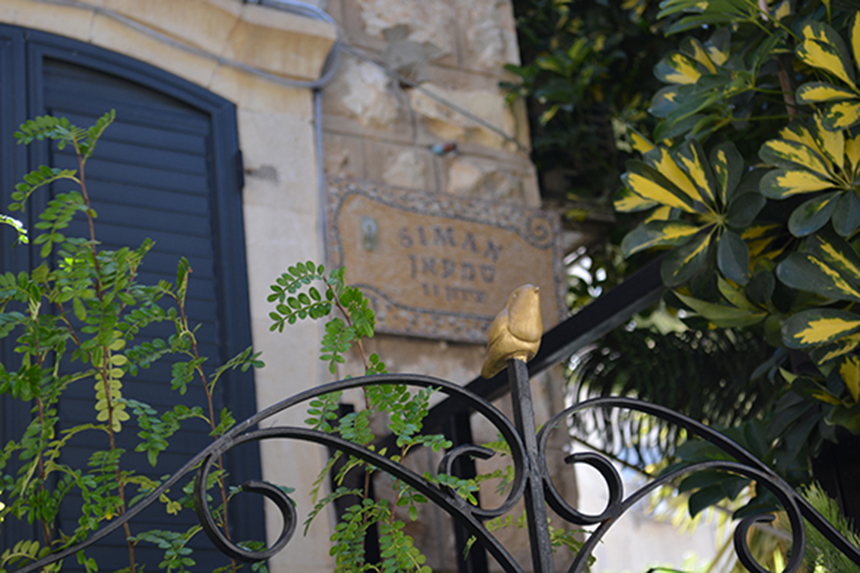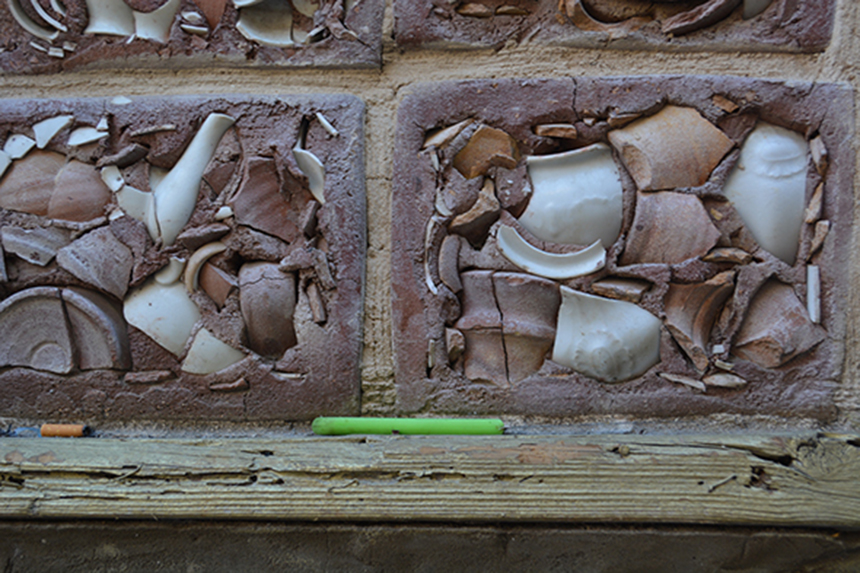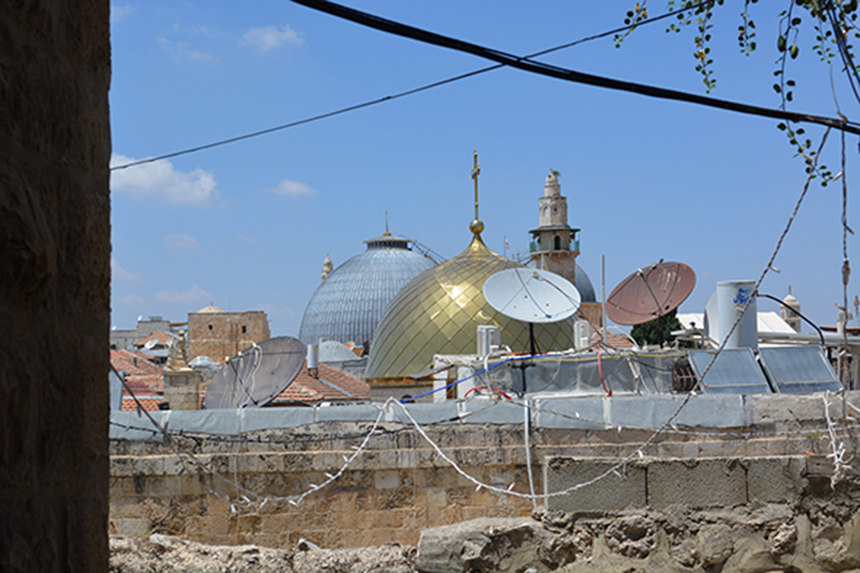The dialogue of hooves and grass
[Editor's note: Vasyl Makhno is a Ukrainian poet, novelist, and essayist who is a laureate of many awards, including "Encounter: The Ukrainian-Jewish Literary Prize"™ (2020), sponsored by the Canadian charitable non-profit organization Ukrainian Jewish Encounter (UJE) with the support of the NGO "Publishers' Forum" (Lviv, Ukraine). His trip to Israel in the summer of 2023 for presentations and research was supported by UJE. The text was written in August 2023, two months before the events of October 7. Now, it serves as a pre-war memory.]
1.
In the nine years since I was last in Israel, the world has changed quite a bit.
First of all, there is a war in Ukraine.
You'd think, what does this have to do with this country that stretches along the Mediterranean Sea? And why am I connecting these Ukrainian events with the word and deeds of the Land of Canaan, for which the word "war," as sacred and historical sources inform us, is as ordinary as the sky and grass? The answer lies on the surface but, at the same time, runs deep with contradictions and things unspoken.
Then, nine years ago, I stayed in West Jerusalem and mostly took public trams and buses to wander around the city. That was when I entered the Old City for the first time and first saw its walls washed in golden rays with my own eyes. I felt the richness of biblical events and the overt contradictions of the adherents of the three monotheistic faiths. For the first time, I walked along the narrow streets and haggled with shopkeepers who, under the guise of flattering words, were ready to swindle me in the blink of an eye. It was the first time I touched the Western Wall, entered the Church of the Holy Sepulchre, visited Jaffa, Haifa, and Akko. After all this, I wrote my book Jerusalem Poems and an essay, "Crickets and Turtledoves."
Nine years passed like rain down the gutter.
I flew back to Tel Aviv, that anthill of the Ben Gurion Airport. After the formalities of crossing the border and customs, I went outside and looked for a taxi.
This time my hotel wasn't far from the sea.
The taxi driver and I got stuck in traffic. I looked around at both sides of the highway and saw how Tel Aviv was developing. Everywhere, there were new skyscrapers encased in the macramé of different kinds of scaffolding and tall construction cranes. We move slowly. The driver warns me that we might be crawling along like this for forty more minutes.
"No problem," I say.
This happens all the time in New York, so I'm not surprised.
After I get checked in, I head out to the beach. It's coming on seven, but the beach at night, as in New York, doesn't close. People are relaxing on orange plastic chairs, but about a dozen of them are far from the shore, jumping and catching waves.
The sun rolls across the horizon, and the seawater, as blue as an Italian plum, darkens and goes to sleep.
2.
The next morning, a few birds observe me over an open-air breakfast. Some of them have already landed on the tables.
They're waiting for leftover food. The numerous visitors have probably taught the local birds to share their breakfasts. A veranda of sorts surrounded by local species of trees whose dense foliage hums with birdsong looks out over the nearby river and a running and biking path. Everyone wants to make good use of the time before the sun reaches its zenith: the birds for singing and snacking, the people for jogs and rides. And so on every morning.
3.
Tel Aviv seizes you with its Hebrew, like the song of birds. Back in the thirties, the small settlement that sprouted from Jaffa, with its primarily Arab population, began growing. In the thirties, the dominant language was Arabic, which even Agnon's wife was committed to learning. This bothered the writer. He remembered the Events of 1929, a trauma that remained with him his entire life. Hebrew waits for you to tune your ear and listen to the conversations of passersby on the street, the announcement of stops on the city buses, and, most importantly, the music of the words of your own poems translated into this language at 6 Kaplan Street, and later in Jerusalem, catching the softened sounds and peeled Rs. It's a very strange feeling to have to spend some time captive to a language you don't understand. Everyone knows that in the newly created state of Israel, there were different opinions regarding the introduction of Hebrew or Yiddish. You could even call it a language war in which Hebrew emerged victorious, and Yiddish was essentially doomed to be a dead language of books. Dead in many senses. We know that most Yiddish speakers from European towns perished during the Holocaust. American Yiddish-speaking Jews switched to English. Only a few writers continued stubbornly using it, in particular, one of its last defenders: Isaac Bashevis Singer.
4.
The world lives in retrograde stereotypes.
In Israel, you become more convinced of this with every step. In Jerusalem, an Orthodox Jew convinced me that everything in the Bible about Jesus makes zero sense from the perspective of Judaism. In a hole in the wall that sells shawarma on Jaffa Street, which Jerusalem trams snake down, none of them wears gloves as they wrap up meat and vegetables. They're not bothered by hygiene rules, though the gloves are right there.
Wolf Moskovich lives in Jerusalem. I got to meet him the first time I visited. I remember sitting in the hallway at the Hebrew University of Jerusalem, speaking about all kinds of things in Ukrainian. This time, we met in Tel Aviv, where the elderly professor had traveled on the occasion of the Ukrainian festival Ethno Khutir. He addressed me by name and patronymic, which I have grown unaccustomed to in America. This address was a sign that returned us both to the land where we were born, Ukraine. Ignoring the noise and loudspeakers, we managed to exchange a few words, assuring each other that we'd meet again in Jerusalem a few days hence. That didn't happen, but those few minutes of conversation were exceedingly wonderful, nevertheless.
In Haifa, I experienced highs and lows in the strictest, non-metaphorical sense. We first took a taxi to the University of Haifa in order to visit the university's museum. The school was on break, so there was no point wandering the empty hallways, but the panorama that opened up from the hill the high campus is built on was impressive. I looked in one direction and saw the new seaport; in the distance, I could see Lebanon and maybe even Syria. Later, we drove to the foot of Haifa and walked along the streets where Christian Arabs live. They have Christian churches, shops, cats, an old construction dating to Ottoman times, and even Poetry Lane. It was walking along it with Anastasia Ester that I realized there was more poetry here than even at the top of Mount Carmel.
5.
In the Agnon House, Hayim Nahman Bialik's birthday is being celebrated with an exhibition: Bialik's correspondence with Agnon, the books they gifted each other, and personal effects such as glasses, pencils, and so on. We drive up to Klausner Street. The talkative cabbie, an Arab whose wife is German, tells us that during one holiday — I think hijab day — he can make three times more than usual.
"Most people," he says, "celebrate, but I'm willing to drive."
He asks where we're going. I tell him, “Beit Agnon.”
"Never heard of it," he says sincerely.
The Jerusalem sun slips behind the hills, and twilight descends.
Jeffrey Saks, the director and great Agnon expert, and I tell our listeners about my novels and Buchach.
The air smells of Agnon's orchard. Some fruits have already ripened and fallen to the grass and the concrete walkway. We squash them as we walk up to the table where the microphones are. Birds are singing. With the twilight, the Jerusalem cool moves in. The wind picks up. It lifts my papers and knocks over the plastic cups set out for us to drink from. Something spills onto the ground. I look at Jeffrey and think to myself that Agnon seems angry with us for some reason and has decided to give us a sign of his presence. Was it because we said "Buchach" a few times?
Another home in the Jerusalem hills I was invited to for a private reading (all thanks to my Hebrew translator, Miriam Feiga Bunimovych) smelled of ripe mulberries and figs. The house was built on a hill. Paths lead down to the house and the orchard, which looked like it was flying headfirst into the valley, stopped only by the sweeping fig. The mulberry was so bountiful that the hairy caterpillars of its black fruits clung to the soles of our shoes. Dark streaks of warm, sticky juice trailed behind us.
My reading was like the Last Supper. At least in one respect — the table was exactly like the one Leonardo da Vinci seated his guests at. There were hors d'oeuvres and drinks on the table, though we had a few more than twelve people. I read about the war and it came and sat down at the table with us, no matter that the couplets were about the expanse of the Atlantic or Yehuda Amichai. Most people had arrived recently: some from the frontlines of Kharkiv and Kyiv, others from the west of our country. But there we were, in the middle of Jerusalem, everyone born in Ukraine, leaving neither our cities nor our memories.
6.
Last time I was in Jaffa, a local professor, Yohanan Petrovsky-Shtern, took me to a shop run by an Arab communist that he frequented. In his youth, the proprietor had studied in the Soviet Union. It's no secret that Patrice Lumumba University in Moscow secretly trained tons of terrorists who returned to the Near East or Latin America to join various partisan units or blatantly terrorist organizations. I remember the piles of old newspapers stacked up around the floor of his shop. We had rushed to see him after gobbling down some warm bread from the closest bakery and had enough time to exchange a few words. But now I don't know if my random acquaintance is still alive. No matter how I searched my memory, I couldn't recall the street it was on.
The Middle East was always under the close watch of many empires. They, the powers of this world, believed that the people there and all their riches should belong to the conquerors. So the Roman, Ottoman, and British Empires all tried to carve out a tasty morsel for themselves. Even Napoleon led his troops to triumph in the siege of Jaffa. By the way, the Port of Haifa was used to transport oil and various spices, as well as a base for troop movements. The British — obviously with the help and even extortion of the locals — laid a pipeline from the oil production sites all the way to the port.
But, the Jaffa Port served as a port of entry for newcomers. Here, the Ottomans' border and customs agencies filtered Ashkenazi Jews, deciding whom to admit and whom to send home. Agnon himself was checked just like this in Jaffa in 1908, showing his Austro-Hungarian passport and stepping out onto the Jaffa shores of his new homeland, though perhaps it's more accurate to say ancestral homeland.
7.
The Zionist ideas to return to Ottoman Palestine and build the Jewish infrastructure for the creation of a Jewish state that captured the youthful imaginations of European Jews in the early twentieth century also reached Buchach, rather, the village of Skomorokhy, where a young Czaczkes was spending time and planning his departure from Galicia. For some reason, the youth of Buchach county gathered there to discuss the future. Even when the writer visited his childhood haunts in 1930, he went to Skomorokhy from where he walked to Zolotyi Potik to measure his young man's memory in steps. Maybe to remember everything.
"In Jerusalem," someone said, "they brought trash cans back at the tram stops."
"So what?" I asked. "What does that matter?"
"It means there's no terrorist threat right now."
"Curious. What's the connection between trash cans and terrorism?" I asked.
"Direct. That's where they hide the bombs."
8.
In the Old City, you can feel like a pigeon on the rocky ledge of the Western Wall or like a turtledove drinking greedily from a fountain. You can be a prayer book on a wheeled cart, a pilgrim standing in line to kneel before Golgotha in the Church of the Holy Sepulchre. You can bloom as an exotic flower or lie like a lazy cat on a nighttime street — after all, someone will bring you some food. You can be a smiling vendor or a dancing Hasid singing at the top of your lungs for the whole neighborhood. You can be a Christian monk or an ultra-Orthodox Jew who, for some reason, spits in the steps of Christians. The city morphs every second from one state to another, leaving us with the aftertaste of the profound mystery that did and still does exist among these walls, hills, and mountains. No matter who or what you imagine yourself to be or what your eye might pause on, Jerusalem holds you at the distance you deserve.
9.
I got lost in Tel Aviv.
I needed to find a certain street to meet with Israeli composer Amos Elkana. I had returned from Jaffa and got on a bus, disembarking when I thought I'd reached the right stop. Once on the street, my phone showed that I was only in the right vicinity. I stopped a passerby, who then pointed at her own phone and told me to follow her. We talked as we walked. She said I should turn left at the next intersection, but she'd keep going straight to pick up her son from daycare.
The confusion of being somewhere new, this loss of spatial orientation, and helplessness often attack me in unfamiliar cities. You feel like a little kid separated from their parents in a crowd.
I finally found Hissin Street.
Across from the building where Amos's studio is located is a small park with a few branching trees. It's a life ring from the heat tossed to you by the municipal services. I decided to sit. Amos was standing on the opposite side. He smiled and waved like, "I see you and invite you in." I answered that we could sit in the microscopic park. Amos agreed and returned after some time with two mugs. One had my tea and the other his coffee. I told him I got lost and that a random woman helped me.
It's a miniature street, quiet and calm.
It's sweltering.
We're actually having a business meeting, for we've been trying to do something with my Jerusalem Verses for some time now.
"Did you know," Amos says, "that street you were on is where the judicial reform protestors gather?" The protests reached all of Israeli society, dividing it into those who were for and against.
"I know about the protests, but I didn't know they were on Kaplan Street."
"Just around the corner," Amos explains. "I'm going back again today."
A hooded crow flies by. Only its head, beak, and wings are black; the rest of its plumage is gray. I've seen similar birds near the Hagia Sophia in Istanbul. I guess their range is the Mediterranean.
Six months ago, in New York's Merkin Hall, I listened to Amos's composition "Tripp." Pierre-André Valade directed the Meitar Ensemble Chamber Orchestra. While listening to "Tripp," I tried imagining which melodic variations Amos would write over the words of Jerusalem Verses. What was the musical enamel that would glaze the lines and stanzas? How would the English translations of the poems fit into the throats of the future performers? Now, on this hot Tel Aviv street, we were reflecting more on politics than music.
10.
The Hecht Museum at the University of Haifa has a large collection of ancient artifacts, from reconstructions of homes, amphorae, frescos, to practical aspects of everyday life, as well as some things related to the Roman Empire's presence in the area. Examples of old weapons stand next to medical instruments from the past. It makes sense: Roman soldiers were persecuted by disease, and quite a few of them suffered casualties during battle or service in their garrisons. There is a split gravestone for one Publius Opius, a citizen of Ravenna and officer who died in battle at the age of thirty. This Publius served in the Fifth Legion based in Macedonia. It was reassigned first to Akko and then to Emmaus. After the Siege of Jerusalem, seventy-one years after the birth of Christ, the unit was redeployed to the territory of modern-day Bulgaria. This all reminded me of a few poems by Constantine Cavafy, who took inscriptions like this that he read in books, and recreated the stories of Greek commanders or soldiers by guessing at their thoughts and feelings. Obviously, Publius Opius did not return with the legionnaires to Moesia, where the surviving remains of the Legio V Macedonica were sent. Besides the everyday and military artifacts, my attention was caught by some small piyalas holding seeds. The captions stated that these plants were used medicinally.
The Dioscurides Constatopolitanus, also known as the Codex Medicus Graecus, was published in the first century A. D.; the original is preserved in the Austrian National Library in Vienna. This vast botanical encyclopedia contains nearly six hundred plants with descriptions of their healing properties and medical uses.
11.
Poetry Lane, in one of Haifa's lower neighborhoods home to Arab Christians, began with a plaque about the poet Hanna Abu Hanna. Walking past the run-down buildings, from time to time, another such sign would appear with an Abu Hanna poem, and I would stop to read the English translation. The poems were presented in three languages: the original Arabic and translations in Hebrew and English. The further my two acquaintances and I got along that alley and the lower into the valley we went, the more small shops appeared, and the number of rusty cars increased, out from under which peered the cats of the alley. I had run into cat colonies in Jerusalem's Old City, on the streets of Tel Aviv, and at Jaffa's flea market, but only in Haifa were their lives connected to poetry, rather, to Poetry Lane. Local plants hung from the walls, showing off their luscious blooms. From far off, I noticed the heavy, yellow fruits of a pomegranate. The color of the skin testified that they were still ripening. A fruit with that characteristic zigzag cap hung over one of the poetry plaques. The poem and the pomegranate complemented each other. They were perhaps even in the middle of an unhurried conversation. It was good that the blessed shade had reached their side of the street. Nearby, a shop owner sat on a dirty plastic chair drinking coffee. There wasn't a shopper in sight. I could smell the bananas, tomatoes, and plums set out on display. He lazily followed us with his gaze, correctly guessing we weren't there to shop. He sipped his coffee and enjoyed the hot evening, draped in shadow.
The Arabs, at least the ones who live here, have a custom that if any plate, dish, or mug slips from one's hands and breaks, they don't throw it out. Rather, they carefully sweep up the pieces and later affix them to the walls of the buildings. The embedded shards play in the sun and cast colors and shapes of their shattered, past ceramic life. One wall is host to the Museum Without Walls, which features handmade ceramic tiles with various subjects: a couple in love, a happy, smiling angel, someone's open hand, a mosque alongside a church, doves.
Walking along Poetry Lane, I caught a whiff of an unpleasant smell, well known to anyone who cohabits with birds. The mystery didn't last long, for I quickly spotted a dovecote someone had fashioned upon one of the walls. Particle board painted white with a few bars; it was obviously handmade. It was apparent that the owner cleaned the multilevel cage, but certainly not hourly.
One of the Arab poet's poems was called "The Dialogue of Hooves and Grass." As the Abu Hanna asserts, in this conversation, the hoof does not get the final word, for the grass it tramples grows again and is renewed.
It's a simple, profound thought.
12.
Roadblocks were set up on the road to Ben Gurion Airport. "The special operation announced in the north must have been launched," I thought. At the checkpoint, they only looked in the taxi's open windows. Still, the group of soldiers and civilians with machine guns was proof that the security and control over the roads had increased. I had watched Israeli evening news on the hotel television. The wave of protest had swept through a considerable portion of society. Whatever they said, the judicial reform had led to a crisis. For what else do you call thousands of people with Israeli flags draped over their shoulders, blowing whistles and shutting down roads or gathering in the center of town and demonstrating their displeasure? Prime Minister Netanyahu's government, the Knesset, the right and the left, Zionists and socialists, the Orthodox and secular, advocates of the judicial reform and its opponents, were shaking up an already complicated society. In everyday life, of course, it goes unnoticed. The buses still scurry about, the shops are open, the Mahane Yehuda market is filled to the brim with goods and shoppers, lines, mostly of the Orthodox, snake outside the welfare offices. Tourists obediently follow their guides around the Old City; the beaches of Tel Aviv and Haifa are occupied by the bronzed bodies of vacationers. The northern expanses stretch all the way to the border with Lebanon, and somewhere very close, cars race down the streets of Jordan. But all the same, considering global political shifts and war, disturbing thoughts occupy more than one Jewish head.
Israel has never been calm. It's not a place where you can feel completely safe. This is how the latest history has unfolded, and everyone knows the causes and effects. It is not without reason — though the parallels don't entirely line up — that the war in Ukraine is being compared to the situation around and within Israel. The country has a large number of immigrants from Ukraine, though the majority of them speak Russian and identify with Russian culture and most of their knowledge of Ukrainian history comes from Soviet propaganda and the textbooks of the time. Yet, in fairness, it must be said that each one has their own family history with its myriad myths. In particular, I heard over and over how, during the Civil War, their grandparents had seen Nestor Makhno or even that this son of Huliaipole and his men had spent the night at their Jewish relatives' homes. When I'd ask if he caused them any harm, they always said, "No." Now they recall their roots, the names of Ukrainian towns and villages, their parents' stories about living with Ukrainians, and they support Ukraine in its difficult battle for freedom. Another portion — and not always immigrants from Russia — stand outside the Ukrainian embassy in Tel Aviv with their posters and support the pseudo-creation of the DNR/LNR; participate in the Haifa city hall's celebration of Russia Days; exclusively read Tolstoy, Dostoevsky, or Bulgakov.
The ones who speak Hebrew, that is, who were born in Israel and claim Iranian, Moroccan, Sephardic, or Ashkenazi roots, might not care about our misfortunes at all. The Hasidim who fly to Uman every year are another matter. Can a Ukraine at war guarantee their safety from Russian shelling if it can't protect its own citizens living along the frontline or even far in the country's west? Israel's American allies are packing aid for Ukraine while Israel waits, saying its hands are tied to Iran and Syria, which is partially true. "Our security," I heard more than once, "is what matters most." What can you say to that?
Now, on the plane headed back to the US, going over in my mind the lines of that Hanna Abu-Hanna, whom I'd never heard of, I considered the conversation the hooves had with the grass. "Well, the hooves and the grass are two opposing forces — destruction and resistance — struggling against each other since the creation of the world." War and peace, life and death, light and shadow. How many more antonyms must pile up to continue this series of oppositions?
A paradox: but they affect each other, are connected, and cannot exist without each other.
What does Ecclesiastes say?
If we're to accept the poet's symbolism, then now we're in the time of the hoof. Will the future be the time of the grass?
Vasyl Makhno
August 2023
Photos: Vasyl Makhno
Originally appeared in Ukrainian @Zbruc.
Translated from the Ukrainian by Ali Kinsella







